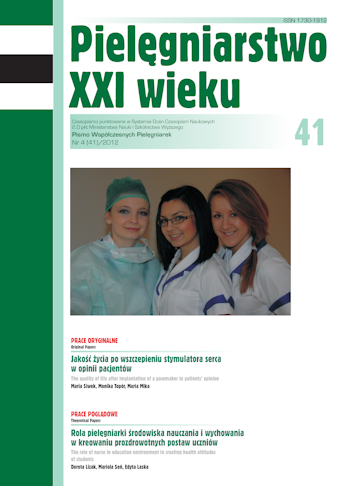Shaping of parental attitudes and strengthening the ties between partners – educational role of the school of birth
Keywords:
school of birth, parenthood, health educationAbstract
SHAPING OF PARENTAL ATTITUDES AND STRENGTHENING THE TIES BETWEEN PARTNERS – EDUCATIONAL ROLE OF THE SCHOOL OF BIRTH
Introduction. The role of prenatal health care of the parents expecting the birth of their child is physical and mental preparation of the parents to fulfill the parental roles. Education during the prenatal period becomes highly important as the highest motivation to shape the actions improving health and the best efficiency of educational interactions takes place precisely in this period.
School of birth seems to be the only place where the future parents can be surrounded with professional care and essential knowledge regarding the pregnancy, childbirth and postpartum period as well as care and feeding of the infant.
Aim. Research purpose was to prove that mutual participation in the classes of the school of birth prepared to fulfill parental roles and influenced shaping and strengthening of the family ties between partners.
Material and methods. The research was carried out at the Department of Obstetrics of the St. Luke District Hospital in Tarnów between 28 October 2005 and 15 March 2006. The research covered 36 women in the postpartum period whose deliveries were preceded by participation in the course of the school of birth with their partners. Author’s survey questionnaire, which consisted of two parts including 35 questions, was applied to conduct the research.
Results. The women participating in the course of the school of birth more frequently with their partners are 26-35 years old, with higher education and expecting the birth of the first child. The image of the parents – partners with duration of the relationship ranging from 1 to 3 years who jointly make decisions important for their relationship, such as mutual participation in the course of the school of birth, common delivery, method and duration of feeding the infant.
Conclusions. The reason for mutual participation in the classes of the school of birth is an intention to prepare for conscious parenthood and mutual participation in the classes of the school of birth facilitates the process of making the decision about a family labour, which influences strengthening the bonds of empathy, co-understanding, and interaction between the partners.
References
1. Bień A, Iwanowicz – Palus G. Narodziny ojcostwa. Zdrowie kobiety - naszą troską. Materiały z III Ogólnopolskiej Konferencji Naukowej, Krosno. 9 -10 maja 2003.
2. Bień A, Iwanowicz – Palus G. Obraz ojca w rodzinie (cz. I). Magazyn Pielęgniarki i Położnej. 2003; 7-8: 58.
3. Bień A, Iwanowicz – Palus G. Obraz ojca w rodzinie (cz. II). Magazyn Pielęgniarki i Położnej. 2003; 9: 40-41.
4. Doroszewska A. Rola współczesnego ojca w opiece nad noworodkiem i jego matką. POŁOŻNA nauka i praktyka. 2012; 1(17):30-33.
5. Preis K, Minowski P. Uczestnictwo męża przy porodzie. Kliniczna Perinatologia i Ginekologia. 2004; Suplement I: 34-37.
6. Fijałkowski W. Poród naturalny po przygotowaniu w Szkole Rodzenia. Warszawa: PZWL; 1989.
7. Kubicka – Kraszyńska U. Przewodnik po szkołach rodzenia i poradniach laktacyjnych. Warszawa: Wydawnictwo Fundacji „Rodzić po ludzku”; 2004.
8. Teleżyńska A, Kubicka U. Przewodnik po szkołach rodzenia i poradniach laktacyjnych. Warszawa: Wydawnictwo Fundacji „Rodzić po ludzku”; 2002.
9. Wasilko E, Krajewska K. Rola Szkoły Rodzenia w przygotowaniu kobiety do porodu i opieki nad noworodkiem. Pielęgniarstwo XXI Wieku. 2005;3(12):149-151.
10. Bożkowa K, Sito A. Opieka zdrowotna nad rodziną. Warszawa: PZWL; 2004.
11. Iwanowicz – Palus G, Kuter A, Stadnicka G i wsp. Rola położnej w promocji i przygotowaniu do porodu rodzinnego. Kliniczna Perinatologia i Ginekologia. 2004; Suplement I: 26-130.
12. Baum E. Jak kochać dziecko. Pielęgniarka i Położna. 2000; 11: 9-11.
13. Karauda M, Łepecka – Klusek C. Aktywny udział małżonków w porodzie. Pielęgniarka i Położna. 2001; 8: 7–8.
14. Karauda M, Łepecka – Klusek C. Poród rodzinny w szpitalu w ocenie małżonków. Pielęgniarka i Położna. 2001; 9: 6-8.
15. Bręborowicz GH. Położnictwo. Podręcznik dla położnych i pielęgniarek. Warszawa: PZWL; 2002.
16. Ćwiek D, Gutowska – Czajka D. Opinie matek na temat obecności osoby towarzyszącej i odczuwania lęku w czasie porodu rodzinnego. Kliniczna Perinatologia i Ginekologia. 2004; Suplement I: 137-140.
17. Szczawińska M. Razem czy osobno? Poród rodzinny. Kraków: Wydawnictwo AZ; 2000.
Downloads
Published
Issue
Section
License
Copyright (c) 2012 Katarzyna Kłopocka-Rutka (Autor)

This work is licensed under a Creative Commons Attribution 4.0 International License.




